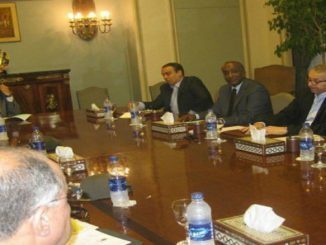Tobruk’s house of representative (HoR) has refused to give its approval to the U.N.-backed government known as the Government of National Accord (GNA), which is considered as a major blow to its efforts to maintain its power in the country.
Of the 101 lawmakers who attended, 61 voted against the government, 39 abstained, and only one sided in favor, according to a statement on the parliament’s website, reported
The Washington Post.
Tobruk parliament is known for its support to General Khalifa Haftar, the leader of a militia known as “Libyan National Army”. Haftar is also supported by Egypt, UAE and France. Monday’s session was chaired by the speaker, Agilah Saleh, who is also in alliance with Gen. Khalifa Haftar.
In January,”the parliament rejected an initial list of ministers proposed by the GNA, and opposition lawmakers have continued to demand a shake-up in Serraj’s cabinet to include more eastern representation,” said the WP.
On the other side, the United States and other Western powers back the GNA which they believe it is Libya’s best chance to fight the Islamic State, resuscitate dwindling oil production and combat the human-trafficking networks flow of illegal migrants crossing the Mediterranean to Europe’s shores.
But until this moment the GNA, with its militias are evacuating the Islamic State from its stronghold in the coastal city of Sirte with help of U.S. airstrikes, couldn’t extend its authority beyond Tripoli. Tobruk government and its HoR support Haftar and want to ensure his position in the new political process.
Moreover, Tobruk government rejected the request of Fayez al-Serraj, the head of the GNA, for US limited military intervention without the approval of its parliament.
As a result, the HoR vote escalated the disputes between the supporters of Fayez al Serraj and his opponents in the parliament over the legitimacy of the vote.
Members of the pro-Serraj bloc claimed they were blindsided, saying the vote was not included in the parliamentary agenda on Monday. Many Serraj supporters did not attend the session.
Mattia Toaldo, senior policy fellow at the European Council on Foreign Relations in London said, “The vote can potentially throw the whole unity process up in the air.”
According to WP, it is unclear whether the HoR’s vote would dissolve the unity government, and compel Serraj to replace some or all members of his cabinet. If it does, analysts say, Libya’s instability could deepen.
Toaldo said, “The legitimacy of the vote could be questioned by some players.” It could also take months, he added, to reach a consensus on new cabinet nominations, and “in the meantime, violence could flare up again either in the oil installations, east of Sirte, or in and around the capital.”
According to Toaldo,”The only way out could be a stronger international mediation that avoids both a stalemate of the institutions and an escalation on the ground.”
After the overthrow and the killing of dictator Mummar al-Qaddafi five years ago, Libya fell into chaos with having two different governments with their loyal militias and tribes. Moreover, the situation became more complicated when the UN-backed government was formed without the two governments’ consensus.




